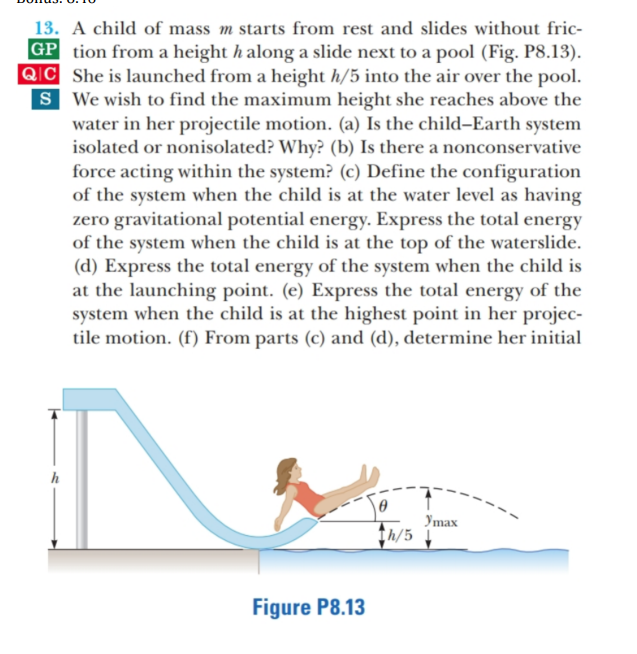13. A child of mass m starts from rest and slides without fric- |GP tion from a height h along a slide next to a pool (Fig. P8.13). QIC She is launched from a height h/5 into the air over the pool. S We wish to find the maximum height she reaches above the water in her projectile motion. (a) Is the child-Earth system isolated or nonisolated? Why? (b) Is there a nonconservative force acting within the system? (c) Define the configuration of the system when the child is at the water level as having zero gravitational potential energy. Express the total energy of the system when the child is at the top of the waterslide. (d) Express the total energy of the system when the child is at the launching point. (e) Express the total energy of the system when the child is at the highest point in her projec- tile motion. (f) From parts (c) and (d), determine her initial Уmax th/5 1 Figure P8.13 speed v, at the launch point in terms of g and h. (g) From parts (d), (e), and (f), determine her maximum airborne height yma in terms of h and the launch angle 0. (h) Would your answers be the same if the waterslide were not friction- less? Explain.
13. A child of mass m starts from rest and slides without fric- |GP tion from a height h along a slide next to a pool (Fig. P8.13). QIC She is launched from a height h/5 into the air over the pool. S We wish to find the maximum height she reaches above the water in her projectile motion. (a) Is the child-Earth system isolated or nonisolated? Why? (b) Is there a nonconservative force acting within the system? (c) Define the configuration of the system when the child is at the water level as having zero gravitational potential energy. Express the total energy of the system when the child is at the top of the waterslide. (d) Express the total energy of the system when the child is at the launching point. (e) Express the total energy of the system when the child is at the highest point in her projec- tile motion. (f) From parts (c) and (d), determine her initial Уmax th/5 1 Figure P8.13 speed v, at the launch point in terms of g and h. (g) From parts (d), (e), and (f), determine her maximum airborne height yma in terms of h and the launch angle 0. (h) Would your answers be the same if the waterslide were not friction- less? Explain.
Physics for Scientists and Engineers
10th Edition
ISBN:9781337553278
Author:Raymond A. Serway, John W. Jewett
Publisher:Raymond A. Serway, John W. Jewett
Chapter8: Conservation Of Energy
Section: Chapter Questions
Problem 13P
Related questions
Question

Transcribed Image Text:13. A child of mass m starts from rest and slides without fric-
|GP tion from a height h along a slide next to a pool (Fig. P8.13).
QIC She is launched from a height h/5 into the air over the pool.
S We wish to find the maximum height she reaches above the
water in her projectile motion. (a) Is the child-Earth system
isolated or nonisolated? Why? (b) Is there a nonconservative
force acting within the system? (c) Define the configuration
of the system when the child is at the water level as having
zero gravitational potential energy. Express the total energy
of the system when the child is at the top of the waterslide.
(d) Express the total energy of the system when the child is
at the launching point. (e) Express the total energy of the
system when the child is at the highest point in her projec-
tile motion. (f) From parts (c) and (d), determine her initial
Уmax
th/5 1
Figure P8.13

Transcribed Image Text:speed v, at the launch point in terms of g and h. (g) From
parts (d), (e), and (f), determine her maximum airborne
height yma in terms of h and the launch angle 0. (h) Would
your answers be the same if the waterslide were not friction-
less? Explain.
Expert Solution
This question has been solved!
Explore an expertly crafted, step-by-step solution for a thorough understanding of key concepts.
This is a popular solution!
Trending now
This is a popular solution!
Step by step
Solved in 5 steps with 1 images

Recommended textbooks for you

Physics for Scientists and Engineers
Physics
ISBN:
9781337553278
Author:
Raymond A. Serway, John W. Jewett
Publisher:
Cengage Learning

Physics for Scientists and Engineers with Modern …
Physics
ISBN:
9781337553292
Author:
Raymond A. Serway, John W. Jewett
Publisher:
Cengage Learning

College Physics
Physics
ISBN:
9781285737027
Author:
Raymond A. Serway, Chris Vuille
Publisher:
Cengage Learning

Physics for Scientists and Engineers
Physics
ISBN:
9781337553278
Author:
Raymond A. Serway, John W. Jewett
Publisher:
Cengage Learning

Physics for Scientists and Engineers with Modern …
Physics
ISBN:
9781337553292
Author:
Raymond A. Serway, John W. Jewett
Publisher:
Cengage Learning

College Physics
Physics
ISBN:
9781285737027
Author:
Raymond A. Serway, Chris Vuille
Publisher:
Cengage Learning

College Physics
Physics
ISBN:
9781305952300
Author:
Raymond A. Serway, Chris Vuille
Publisher:
Cengage Learning

Principles of Physics: A Calculus-Based Text
Physics
ISBN:
9781133104261
Author:
Raymond A. Serway, John W. Jewett
Publisher:
Cengage Learning

Physics for Scientists and Engineers, Technology …
Physics
ISBN:
9781305116399
Author:
Raymond A. Serway, John W. Jewett
Publisher:
Cengage Learning